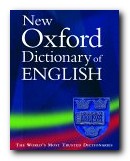new single-volume compilation based on modern usage
The New Oxford Dictionary of English is a one-volume giant from Oxford University Press and a departure from their normal practice. Instead of being based on other dictionaries, it’s a completely new selection of words, compiled after in-depth analysis of computerized databases of contemporary English. The emphasis is very much on current relevance. Each word is defined first by its modern meaning, as used by the majority of people. Rulings are given on tricky questions of usage – [due to is not the same as because of, for instance]. These provide advice on old and new problems.
 This populist approach may not please traditionalists, but the dictionary is certainly very user-friendly – and that’s in there too. The other principal novelty is the inclusion of encyclopedia-type entries. So, for instance, opening randomly at the letter ‘P’ – you are offered ‘perquisite’, followed by potted biographies of Charles Perrault, Fred Perry, and Persephone; then a micro-history of Persia, and an explanation of correct usage for the ‘personal pronoun’. I suspect these will make this a popular choice for those people who want a serious dictionary and a useful general reference book all in one.
This populist approach may not please traditionalists, but the dictionary is certainly very user-friendly – and that’s in there too. The other principal novelty is the inclusion of encyclopedia-type entries. So, for instance, opening randomly at the letter ‘P’ – you are offered ‘perquisite’, followed by potted biographies of Charles Perrault, Fred Perry, and Persephone; then a micro-history of Persia, and an explanation of correct usage for the ‘personal pronoun’. I suspect these will make this a popular choice for those people who want a serious dictionary and a useful general reference book all in one.
Brief notes on word history explain the linguistic roots of words and tell the story of how a word’s meaning and form have changed over time. Modern pronunciations are also given, using the internationally recognized pronunciation system. A rapid-reference page design separates out parts of speech, word histories, and phrases.
This new revised edition embraces the OUP’s latest style of having the headword printed in a bold san-serif font, with the explanation which follows in Times Roman (serif). Extra notes then revert to san-serif in a grey box. All this variety makes it something of a typographic jumble – but it is easy to use. Here’s what a typical entry looks like:
ear 1 > noun the organ of hearing and balance in humans and other vertebrates, especially the external part of this
• an organ sensitive to sound in other animals. •
[in sing.] an ability to recognise, appreciate, and reproduce sounds, especially music or language: an ear for rhythm and melody. • used to refer to a person’s willingness to listen and pay attention to something: she offers a sympathetic ear to worried pet owners.The ear of a mammal is composed of three parts. The outer or external ear consists of a fleshy external flap and a tube leading to the eardrum or tympanum. The middle ear is an air-filled cavity connected to the throat, containing three small linked bones that transmit vibrations from the eardrum to the inner ear. The inner ear is a complex fluid-filled labyrinth including the spiral cochlea (where vibrations are converted to nerve impulses) and the three semi-circular canals (forming the organ of balance). The ears of other vertebrates are broadly similar.
– PHRASES be all ears informal
be listening eagerly and attentively. bring something (down) about one’s ears – bring something, especially misfortune, on oneself; she brought her world crashing about her ears. one’s ears are burning – one is subconsciously aware of being talked about or criticized. grin (or smile) from ear to ear: smile broadly. have something coming out of one’s ears: have a substantial or excessive amount of something: that man’s got money coming out of his ears. have someone’s ear have access to and influence with someone: he claimed to have the prime minister’s ear. have (or keep) an ear to the ground – be well informed about events and trends. in (at) one ear and out (at) the other – heard but disregarded or quickly forgotten: whatever you tell him seems to go in one ear and out the other. listen with half an ear not give one’s full attention. be out on one’s ear informal be dismissed or ejected ignominiously. up to one’s ears in informal very busy or deeply involved in: I’m up to my ears in work here.
— DERIVATIVES eared adjective [in combination] long-eared, earless adjective.
— ORIGIN Old English ëare, of Germanic origin; related to Dutch oor and German Ohr, from an Indo-European root shared by Latin auris and Greek ous.
ear 2> noun the seed-bearing head or spike of a cereal plant.
• N. Amer. a head of maize.
— ORIGIN Old English ëar, of Germanic origin; related to Dutch aar and German Ähre
© Roy Johnson 2005
The New Oxford Dictionary of English, 2nd revised edn, Oxford: Oxford University Press, 2005, pp.2010, ISBN: 0198610572
More on dictionaries
More on language
More on literary studies
More on grammar